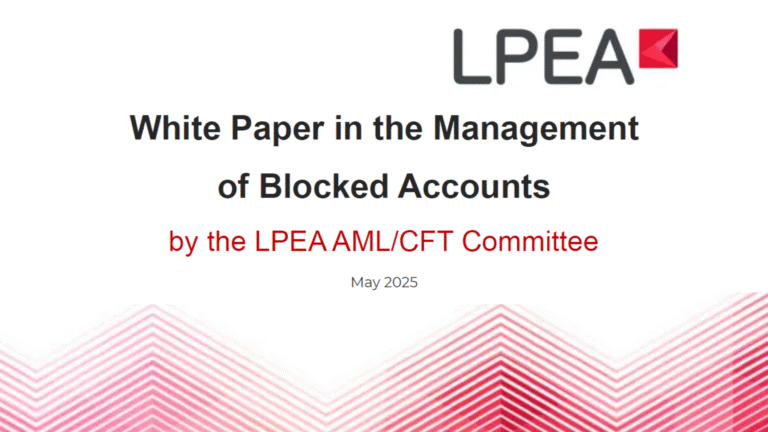By the Legal TC – Corporate law group of the LPEA
EXECUTIVE SUMMARY
Until recently, there was a legal uncertainty as to whether the prohibition of operations of financial assistance – i.e. situations where a company the shares of which are issued or sold to a party makes loans to or provides security for the benefit of that party for purposes of facilitating the share issue or acquisition – also applied to SARLs.
Further to a recent legislative change, it has now been made clear that the SARL is not caught by such prohibition, although certain limitations remain and must be taken in consideration by the board of managers of a SARL willing to provide financial assistance to the subscriber or transferee of some of its shares.
1.Amendment of the company law
1.1 The recently adopted law of 6 August 2021 amended article 1500-7 2° of the law on commercial companies dated 10 August 1915 (the “Company Law”) by removing reference to shares / corporate units in private limited liability companies (parts sociales) from the provision stipulating criminal sanctions for acts of irregular financial assistance.
1.2 The amended provision of the Company Law now reads as follows:
“Art. 1500-7. The same penalties shall apply to any person who, in his capacity as director, statutory auditor, manager or member of the supervisory committee, knowingly: (…) 2° made loans or advances using company funds or provided security with a view to the acquisition of shares or corporate units in the company or taken a pledge on the company’s shares or corporate units, in violation of Articles 430-19 and 430-21 in the case of public limited companies (…).”[1]
1.3 This amendment has cleared any remaining doubt regarding the interpretation of article 1500-7 of the Company Law in its previous form, in which the reference to the SARL’s corporate units was, to the legislator’s admission, left unintentionally when this provision was revised in the framework of the 2016 general reform of the Company Law. As from the entry into force of the law of 6 August 2021, which has been set to 16 August 2021, criminal sanctions applicable to the members of management bodies who caused a company to be involved in irregular financial assistance do not apply to Luxembourg private limited companies.
2.Practical implications
2.1 Neither Title VII of the Company Law applicable to Luxembourg private limited companies nor the provisions of the Company Law applicable to all commercial companies (including, in particular, the criminal sanctions’ provisions) provide for any specific rules prohibiting or limiting a private limited company in engaging in financial assistance, i.e. in making loans or advances, or providing security, for the purpose of the acquisition of its own shares.
2.2 However, the absence of a specific regime governing financial assistance in private limited companies does not imply that this practice is “off-limits” of the Luxembourg corporate law and may be carried out in a fully discretionary manner. The general provisions of the law, including, in particular, those concerning the management of Luxembourg companies (including private limited companies) constitute the relevant legal framework in this respect.
2.3 For instance, managers (gérants) of private limited companies, when contemplating involving the company in a financial assistance transaction, should consider the merits of the transaction from the point of view of the company’s corporate interest.
2.4 While article 430-19 (1) 1° of the Company Law requiring the board of directors of public limited companies to ensure that financial assistance is granted on fair market conditions, including as regards the remuneration and guarantees obtained by the company, is not directly applicable to private limited companies, the idea that the company should draw benefit from granting financial assistance and, at the same time, adequately protect its interests, should also apply to all commercial companies, including private limited companies. Managers of private limited companies should carefully consider these aspects before committing their company to providing financial assistance for the benefit of another party.
2.5 While the corporate interest of a company is not defined in the law and is always a matter of assessment on a case-by-case basis, it is recommended that managers ensure that they are able to demonstrate a tangible benefit that the company is expected to draw from granting financial assistance. Financial assistance without immediate direct or indirect benefit for the company should be subject to especially careful scrutiny. In particular, situations where financial assistance does not involve immediate consideration and is justified on the grounds of the interest of the group to which the company belongs may carry certain risk due to the criteria of assessment of what should qualify as the interest of the group not being clearly defined and subject to interpretation and to the concept of group interest not being recognized as such under Luxembourg corporate law.
2.6 As for any transaction to which a company is a party, the managers of a private limited company should carefully consider its liquidity position before deciding on the granting of financial assistance. It is imperative to ensure that financial assistance does not expose the company to an undue risk of insolvency in the short or long term.
2.7 Granting financial assistance by a private limited company while disregarding its corporate interest or endangering its solvency could expose the company, its managers and potentially even other parties involved in the transaction to serious consequences. In particular, the managers should be mindful of the fact that:
a)such conduct could expose them to a risk of civil liability vis-à-vis the company and, in particularly serious circumstances, even vis-à-vis third parties;
b)in extreme situations, where financial assistance is granted in a fraudulent manner to favour the managers’ own interests to the detriment of the company’s interest, the managers could be exposed to the risk of criminal liability for misuse of corporate assets;
c)in a situation where the company becomes insolvent, the earlier granting of financial assistance (especially during the so called “hardening period” immediately preceding the declaration of bankruptcy) could, under certain circumstances, expose the managers to the risk of aggravated civil or even criminal liability for the bankruptcy of the company;
d)abusive or fraudulently granted financial assistance could be declared null and void on the grounds of contrariety to the public order, as a result of which the whole financing scheme could be unwound.
[1] « Art. 1500-7. Seront punis des mêmes peines tous ceux qui, comme administrateurs, commissaires, gérants ou membres du comité de surveillance, auront sciemment : (…) fait des prêts ou avances au moyen de fonds sociaux ou donné des sûretés en vue de l’acquisition d’actions ou de parts sociales de la société ou pris en gage des actions ou des parts sociales propres et ce, contrairement aux articles 430-19 et 430-21 dans le cas des sociétés anonymes (…). »




